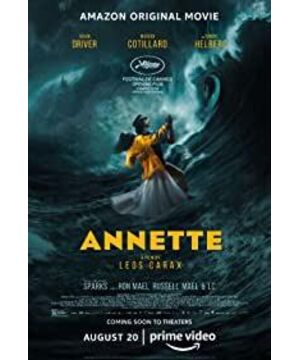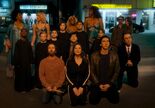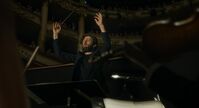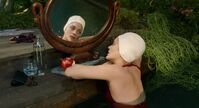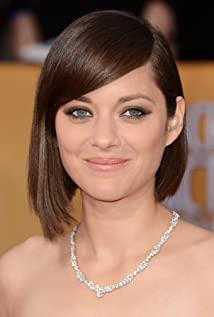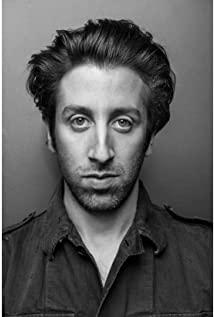At first I thought that Karax wanted to replace the "virtue" in the object world with "music" and make it our judgment rule and code of conduct, but as the film progressed, I found that it was not only the object world that changed. Matter, as well as the form of the phenomenal world, according to the thinking principles we cultivated in the object world, we will spontaneously symbolize the object and interpret the symbol, analytically clarify the universal nature and exclusive quality of each object, and then Comprehensively understand the relationship between objects and the value premise of objects in the phenomenal world. In a word, whether it is perceptually perceived or sorted out by intellect, these are all empirical, but the quality of experience is not. What the movie itself contains, but for the relationship between the audience and the screen, after all, these are entities in the object world, so only by eliminating the entities in the object world of the audience and the screen can the movie show itself purely, However, the author does not want to tyrannically destroy the audience and the screen, but to make the audience and the screen self-evidently disengage from the entity - control your breathing, thereby weakening your functional effects and instrumental rationality, when all functional effects and instrumental rationality are destroyed. When it is eliminated, the subject of the audience is left with only the will of a fairy tale, which is regarded as a pure fairy tale, and the screen is reduced to music that can directly communicate with the subject (in the object world, only music can directly communicate with the subject beyond all senses). . In such a phenomenal world with no purpose and only form, the "screen" (music) is no longer the tool of the "audience" (the will of the fairy tale), but the sum of the principles of the "audience". As the only facultative effect of the will of the fairy tale, it may be called the "musical sense". But when we break away from the film to write a film review, we inevitably return to the empirical thinking fixation. In order to write a film review without violating the spiritual core of the film, we need to complete two tasks: 1. Explain the "music" Senses" are possible in the world of objects. 2. Show in detail the experience of the "musical sense" in the process of the phenomenal world defined by the subject as the object world in the film.
1. How is the musical sense possible in the object world?
Music sense is the only functional effect of fairy tale will, according to the concept of perceptual category: the organs of the organism correspond to the purpose one by one, that is, the value of the subject lies in the probability of the realization of its purpose. But the will of the fairy tale itself is a form, not a purpose, so the musical sense is not a tool for a purpose or a value premise for speculation, but a pure product of perceptuality. The reason why it is called a sense is because In the realm of sensibility, sensory effects are more prescriptive than rationality, and that's all, it does not mean that the musical senses have the universal purpose of the senses. But some people doubt that the purpose of the musical sense is not to define the phenomenal world in the movie? In fact, this kind of doubt is just the product of our fixed thinking function in the object world. In the object world, we have a variety of functional effects. While they help the subject achieve their goals, they also cause many subjective restrictions on the will of fairy tales. In today's object world The biggest subjective limitation we face is the dialectics of mechanical utilitarianism, which makes the purpose in the subject outweigh the will, but the subject does not encounter these problems in the phenomenal world, because behind the phenomenal world is the extrasensory world. The extrasensory world is exclusive, exclusive, and has no time and space stipulations. It can exclude all subjective limitations of the musical sense, and at the same time, it will not exert an influence on the musical sense as a representation. The irrelevant multiplicity of the senses enables it to exist independently like a science and retain the material it contains, which is why the musical sense can be called a sense without the universal nature of the senses, while music The only reason the senses, of all the senses, can be representations in the extrasensory world is because of the nature of music: music is the permanent form of the deterministic process of force, it desires to be stretched in the depths of the soul, it cannot be calm, and it never is. However, the organic combination of its insubstantiality and force is telling us: the world has no purpose, no final state, and cannot reach the level of "existence", all appearances of the world are in the dark night of its inner life, The only world that can meet such characteristics is the extra-sensory world, and the extra-sensory world is behind the phenomenal world shown in the film. Intuitively, if the phenomenal world in the movie is a castle, Karax is the owner of the castle. , he gave us the key of the castle through the only window (sound) of the castle at the beginning of the movie, the musical sense, we opened the gate of the castle after confirming the accuracy and utility of the key, the lock on the gate is the extra sense The appearance of the world in the object world, and the real extrasensory world is deep in the castle, although we do not have direct contact with it, it has been attracting Introduce us as subjects of fairy tale will. What we need to accomplish in the next task is to show in detail the experience of the musical sense in the process of the phenomenal world in the movie being defined as the object world by the subject.
2. The experience of the musical sense in the process in which the phenomenal world in the film is defined as the object world
The subject that defines the representation in the phenomenal world is not the general individual, but the general fairy tale will. The basis for the determination is not reason, but the musical sense as a functional effect. In the category of musical sense, Ann is defined as the music that may be the purpose. For the senses, Henry is defined as the musical sense as a form, the conductor is defined as the subject of music, and Annette is defined as the possible form of the musical sense in the extrasensory world, that is, the pure musical sense. On the stage where possible phenomena are displayed, the musical senses that may serve as the purpose conform to the fixed thinking function of the general audience in the object world, that is, in the perceptual category, there is a one-to-one correspondence between the organs and the purposes, and the audience can easily believe that the purpose of the musical senses is " a tragic demise, a mythical nothingness, and at last only tears", it seems that the peculiarity of the musical sense in all senses is that its purpose is nothingness and passion, while the purpose of the other senses is mechanical utility and existence, and if so, Karax does not need to extract our musical senses alone, just make a melodrama that makes people cry, and there is no need to specifically represent a phenomenal world. Therefore, in a phenomenal world, it is impossible to have a musical sense as a purpose. Only the musical sense as a form (Henry), he uses the appearance of the extra-sensory world (sea storm), the musical sense as a form kills the musical sense that may be a purpose, and obtains dictatorial power on the stage, that is, a fairy tale The will can only recognize experience in the phenomenal world through the musical sense as a form. But after leaving the stage of possible phenomena, the appearance of the musical sense as a possible end still exists, and she and the musical sense as a form comprehensively confirm the reality of the appearance of the pure musical sense (Annette). In order to be able to visualize the material of the pure musical sense, the musical sense as a form kills the conductor as the subject of music, seizes the power of the subject of music, and after seizing all the power of the stage and subject of music, combines the will and power of the fairy tale The musical sense of the will exhibits the matter of the pure musical sense in all possible spheres of phenomena, but when the pure musical sense is also defined as the subject of music, its matter proves impossible, and all the rules are invalidated, and it is possible to act as a The musical sense of purpose has changed back to Ann in the object world, the musical sense as a form has changed back to Henry in the object world, and the subject of music has changed back to the emotional and critical conductor in the object world as a general individual. The pure musical sense of the marionette turns back to Annette in the object world - Annett as an individual e, we viewers also return to the object world—with a sense of disappointment at the failure to explore the extrasensory world. Ann, Henry, conductor, Annette, the audience, we are all living people in the object world. We recalled a dream in the phenomenal world. In the memory, "music" also changed back to "screen".
View more about Annette reviews


